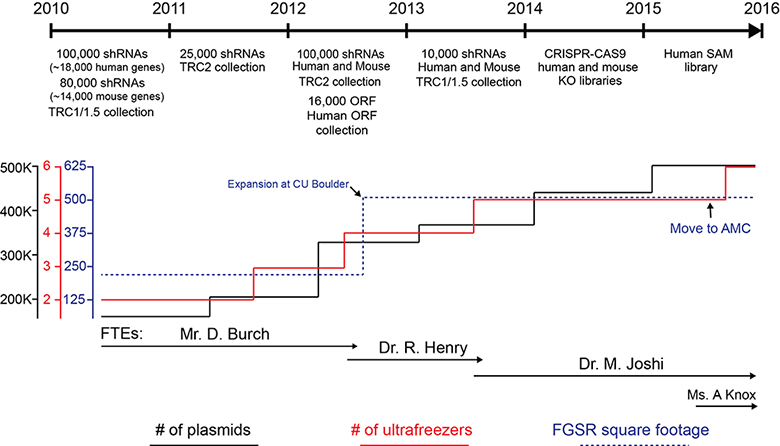HISTORY

Functional Genomics is defined as the field of molecular biology that enables exploration of gene and protein function not only at the individual gene level, but also on a genome-wide scale. With the completion of the Human Genome Project and the development of new technologies such as RNA interference (RNAi) and High-Throughput Sequencing, it has become possible to perform genome-wide genetic screens in mammalian cells that were previously only feasible in model organisms such as yeast, flies and flatworms. In 2010, the University of Colorado leadership recognized the profound impact of Functional Genomics on biomedical research, and a consortium of the University of Colorado's Biofrontiers Institute, the University of Colorado Cancer Center, the Department of Molecular, Cellular and Developmental Biology, the Howard Hughes Medical Institute, and the Espinosa Lab wroked together to create the Functional Genomics Facility. Thus, our Facility began its operations in May 2010 under the direction of Dr. Joaquín Espinosa. Since then, we have rapidly become one of the most heavily used core facilities, serving more than 170 laboratories across the state. We are one of the Shared Resources of the UC Cancer Center, which supports us through the Cancer Center Support Grant (CCSG) 5P30CA046934 and developmental funds.
Through constant assessment of novel technologies and client labs' needs, we acquired diverse Functional Genomic tools, such as short hairpin RNA (shRNA) libraries, Open Reading Frame (ORF) libraries and CRISPR libraries. This has effectively catalyzed a flurry of scientific activity in our state, thus bringing our scientific community to the forefront of the Functional Genomics field. Using shRNA libraries, CRISPR libraries and technical support provided by the Facility, many laboratories have completed diverse types of genetic screens in human and murine cells. This has resulted in numerous high impact publications elucidating novel molecular mechanisms, some of which lead to novel therapeutic strategies. In the future, we will continue to gauge the need for and acquire novel Functional Genomics tools, as well as develop the protocols required to employ these tools to continue empowering researchers in Colorado to perform more advanced research in this key field of modern biology.
